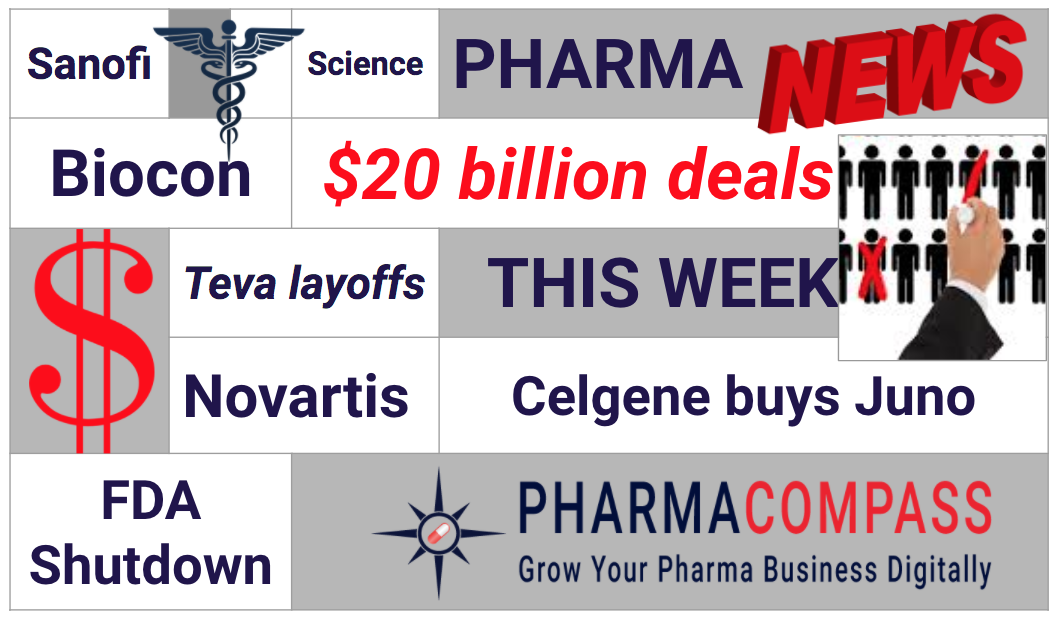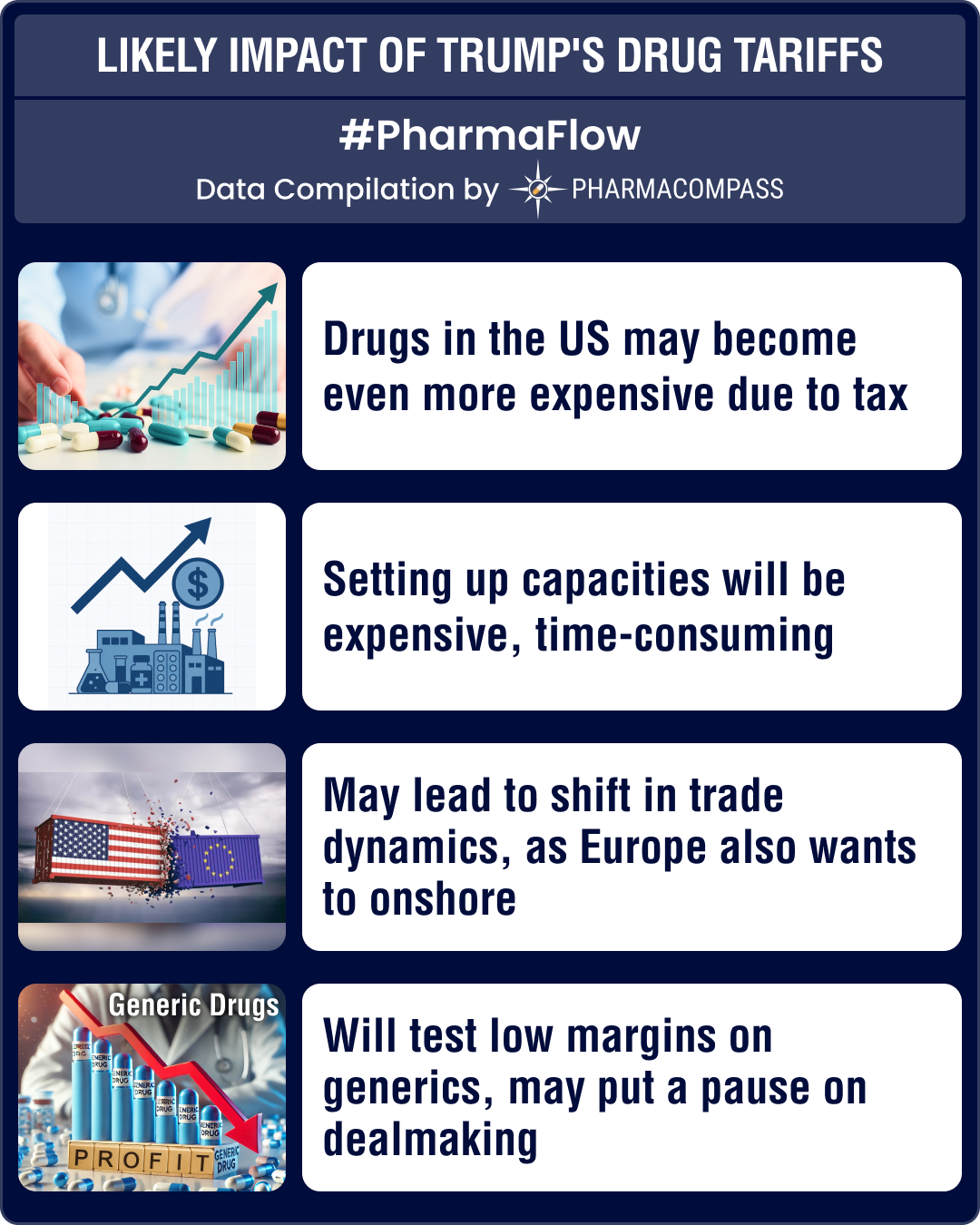
The first month of 2018 ended with a bang, with several big ticket M&A deals and bids. While Sanofi bought Bioverativ for US$ 11.6 billion, Juno Therapeutics announced it was getting acquired by Celgene in a deal worth US$ 9 billion. Meanwhile, India’s Ipca Laboratories bought US-based Pisgah Labs, despite having three of its plants on an import alert. And events organizer Informa made a bid to buy its rival — UBM. Phispers also carries news of layoffs in the US — while Teva is laying off 200, Sanofi is axing 400. Biocon struck a biosimilar deal with Novartis, and in the US, the FDA saw 42 percent employees furloughed during the recent shutdown.
A
week of US$ 20 billion deals: Sanofi acquires Bioverativ; Celgene picks up Juno
The week began with a big bang M&A deal — on Monday, French drugmaker Sanofi announced it has closed a deal to acquire Biogen spinout Bioverativ, a maker of drugs for hemophilia, for almost US$ 11.6 billion.
This acquisition helps us understand a newly reworked pact between Alnylam and Sanofi that puts the latter on course to building a franchise in the field of hemophilia.
“With Bioverativ, a leader in the growing hemophilia market, Sanofi enhances its presence in specialty care and leadership in rare diseases, in line with its 2020 roadmap, and creates a platform for growth in other rare blood disorders,” Sanofi CEO Olivier Brandicourt said in a statement.
Recently, Roche won a nod for its hemophilia drug Hemlibra. While the deal gives Sanofi a big stake in the fast-changing hemophilia market, its Bioverativ’s business is threatened by Roche and developers like BioMarin and Spark/Pfizer, who are looking to disrupt the business with new gene therapies now in late-stage development.
The second big deal of the week was the acquisition announcement of Juno Therapeutics, Inc by Celgene Corporation. Under the terms of the agreement, Celgene will pay approximately US$ 9 billion for Juno.
Juno is a pioneer in the development of CAR (chimeric antigen receptor) T and TCR (T cell receptor) therapeutics with a broad, novel portfolio evaluating multiple targets and cancer indications. This acquisition will add to Celgene’s lymphoma program, JCAR017. Regulatory approval for JCAR017 in the US is expected in 2019. With this acquisition, Celgene hopes to deliver a new CAR-T with peak sales of US$ 3 billion a year.
“The acquisition of Juno builds on our shared vision to discover and develop transformative medicines for patients with incurable blood cancers,” Celgene’s CEO Mark J. Alles said.
Indian firms on
buying spree: Ipca buys Pisgah Labs; Torrent expands in US
Two Indian pharmaceutical companies made news in the M&A space — Ipca Laboratories and Torrent Pharmaceuticals.
In June, the US Food and Drug Administration (USFDA) had banned almost all drugs manufactured by India’s Ipca Laboratories at its facilities at Pithampur, Silvassa and Ratlam for violation of current good manufacturing norms (cGMPs).
While continuing to be on the import alert list of the USFDA, Ipca Laboratories said its two subsidiaries have fully acquired US-based Pisgah Labs Inc for US$ 9.65 million.
Pisgah, a contract manufacturer and developer of APIs and intermediates, will continue to operate out of its North Carolina manufacturing facility under the Pisgah trade name.
Meanwhile, Ahmedabad-based Torrent Pharmaceuticals Ltd announced the acquisition of Bio-Pharm Inc, a drugmaker based in Pennsylvania, US. The company did not disclose the deal size or other financial details.
“This acquisition is an important step for increasing Torrent’s presence in the United States, is consistent with our strategy of dosage form diversification, and provides us with new capabilities including manufacturing and R&D presence in the USA,” Torrent said in a media statement.
Bio-Pharm, a generic pharmaceuticals and over-the-counter (OTC) drugs company, has a proven track record in the research and development and manufacturing of oral solutions, suspensions and suppositories, it said.
With an annual revenue of more than US$ 911.8 million (INR 58 billion), Torrent Pharma is the flagship company of the US$ 2.9 billion (Rs 183 billion) Torrent Group.
Teva’s asthma drug fails to deliver; to layoff 200 in US; Sanofi to layoff 400!
After acquisitions, lay-offs made the second big news this week. Not just in Israel, Teva’s cost cuts are also causing turbulence at its North American headquarters. The Israeli generic drug company is laying off more than 200 workers in and around its North Wales, Pennsylvania, home base.
Teva has retrenched 65 employees across three buildings in Horsham, Pennsylvania, and North Wales, 96 across sites in Fraser and Great Valley, Pennsylvania, and 47 more at a West Chester, Pennsylvania, location. These layoffs come as part of Teva CEO Kåre Schult’s new restructuring plan that targets a reduction in annual costs by as much as US$ 3 billion.
The spate of bad news for Teva continued unabated. This week, there was news that Teva’s two late-stage studies testing its treatment for asthma did not meet their main goals. The studies were testing Teva’s subcutaneous dosing of reslizumab in patients with uncontrolled asthma and elevated blood eosinophils. The drug is already approved as an intravenous shot to treat patients with severe asthma.
“We are disappointed that these trials of the reslizumab formulation administered subcutaneously at a fixed-dose of 110 mg did not meet their primary endpoints,” said Tushar Shah, managing director and senior vice president, Specialty Clinical Development and Medical Affairs at Teva.
Meanwhile, Sanofi said it is eliminating 400 workers in the US due to plummeting sales of its diabetes and cardiovascular medicines. Sanofi didn’t disclose restructuring expenses or its savings target. The company said its cardiovascular specialty sales team, which sells cholesterol drug Praluent, would not face any disruption.
The reorganization will “enable us to continue to adapt to the ever-changing market, and allow us to focus on our recent launches while setting us up for success in the future,” Sanofi spokesperson said.
After FDA nod for
its Herceptin biosimilar, Biocon strikes deal with Novartis
In early December, Biocon and Mylan combine had won the USFDA nod for the first Herceptin biosimilar. Well, Biocon is now capitalizing on that approval — it struck a deal last week to develop copycat versions of biologic drugs with a unit of Novartis AG.
This is being seen as Biocon’s latest move to become a global player in the next generation of generic medicines.
According to Bengaluru-based Biocon, Novartis’ generics unit Sandoz will focus on developing biosimilars of biologic drugs in immunology and oncology. The two will share development, manufacturing and regulatory costs and profits globally. While Sandoz will be responsible for commercialization in North America and the European Union, Biocon will handle the rest of the world.
Biocon is a busy player in the growing business of biosimilars. However, Kiran Mazumdar-Shaw, Bicon’s chairman and managing director, said the process can be a costly one. While developers can essentially start in Phase III, they still have to prove the similarity between the knockoff and the original, a process which Mazumdar-Shaw estimates costs US$ 100 million to US$ 200 million for each project.
“This synergistic partnership will enable us to scale up our capabilities for an end-to-end play in the global biosimilars space,” Mazumdar-Shaw said.
Informa makes a
bid to buy major pharma trade show (CPhI) organizer UBM
British events organizer Informa is in talks to buy rival conference organizer UBM Plc, whose portfolio includes a number of pharmaceutical industry events, including CPhI. The plans were confirmed by both companies through a joint statement. Informa will pay US$ 5.2 billion (GBP 3.8 billion) for UBM.
A decade back, merger talks between Informa and UBM had fallen through. According to a Bloomberg news report, the proposed merger will give both players a chance to plug gaps in each other’s programs. It will also give them a global footprint, and an opportunity to challenge Relx Group Plc’s claim to being the world's leading events company.
Informa’s CEO Stephen A. Carter said in an interview that such opportunities “don’t come along very often”. Informa and UBM have big operations in the US but broadly complimentary businesses in the Middle East and Asia.
US government shutdown – 42 percent of FDA staff were furloughed
On Monday, Senators in the US decided to end the three-day long government shut down. Senate Democrats buckled under pressure to adopt a short-term spending bill to fund government operations without first addressing the fate of the young undocumented immigrants.
The House approved the measure that will fund the US government through February 8 and extend funding for the popular Children’s Health Insurance Program for six years.
During the shutdown, the FDA ensured all its employees received accurate, timely information about their status, given the lapse in funding. All FDA employees were asked to report to work on Monday, January 22.
“The FDA plays a critical public health role, and during the lapse period, the agency will be continuing vital activities that are critical to ensuring public health and safety in the United States, consistent with the law,” USFDA Commissioner Scott Gottlieb had said in an email addressed to its employees.
Thanks to the user fees paid by biopharmaceutical and medical device companies, 58 percent of USFDA staff would have still continued to work if the government had been shut down for longer, Gottlieb said in a statement. USFDA user fee programs have grown significantly since 2013.
“FDA’s current shutdown plan provides for 58 percent of workforce continuing to work and 42 percent furloughed. The number of FDA employees continuing to work in this shutdown is projected to be an increase from past shutdowns,” Gottlieb said.
The PharmaCompass Newsletter – Sign Up, Stay Ahead
Feedback, help us to improve. Click here
Image Credit : Phisper Infographic by PharmaCompass is licensed under CC BY 2.0
“ The article is based on the information available in public and which the author believes to be true. The author is not disseminating any information, which the author believes or knows, is confidential or in conflict with the privacy of any person. The views expressed or information supplied through this article is mere opinion and observation of the author. The author does not intend to defame, insult or, cause loss or damage to anyone, in any manner, through this article.”






